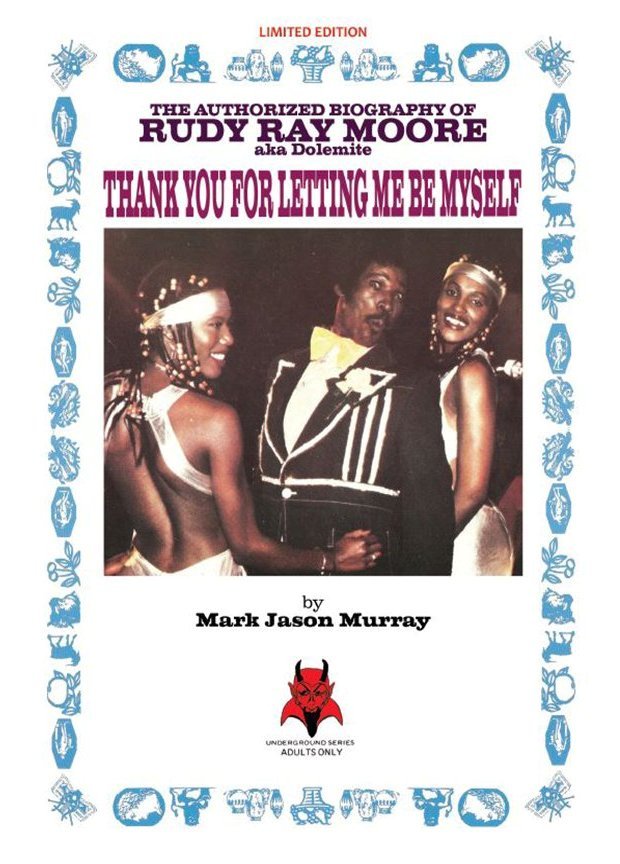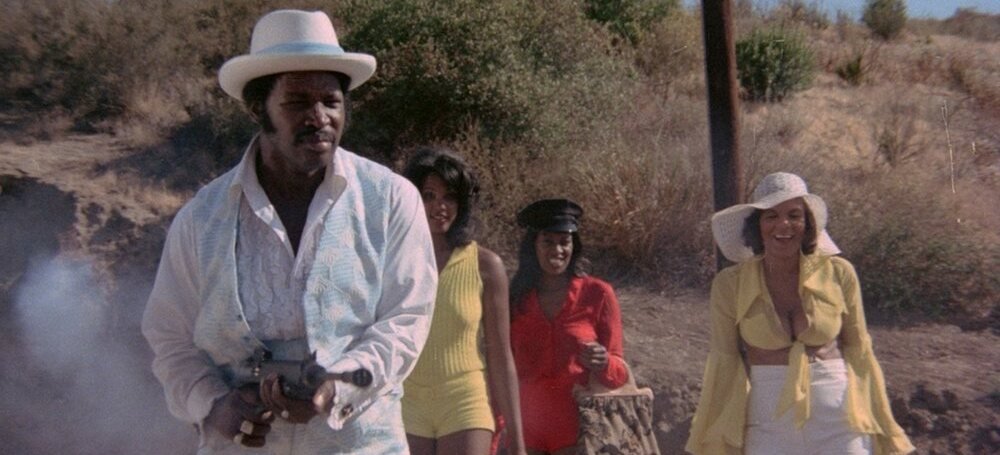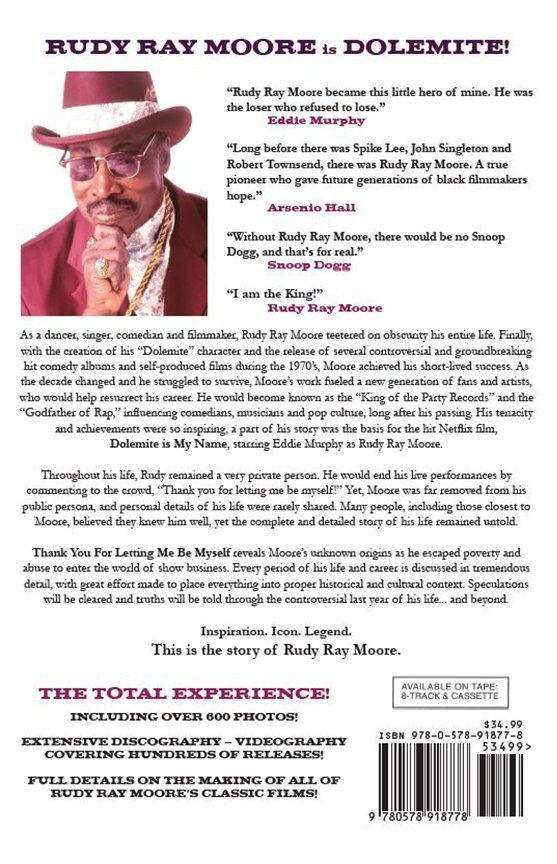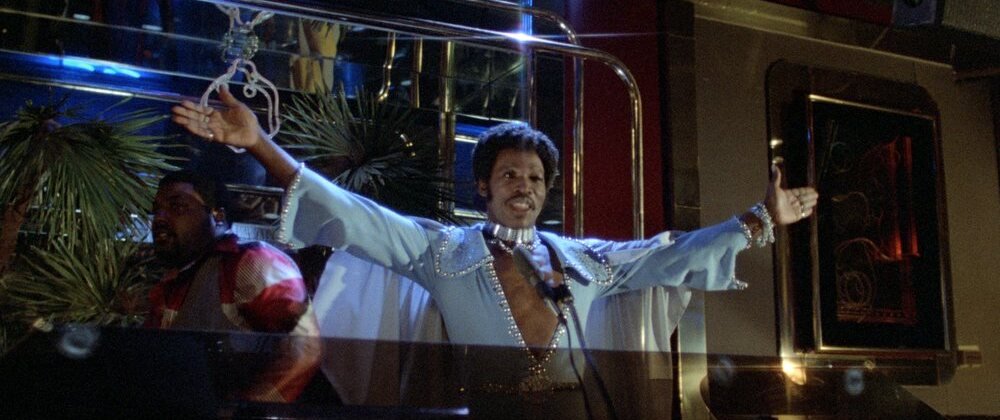THANK YOU FOR LETTING ME BE MYSELF: Rudy Ray's Day Has Finally Arrived
A lot of exploitation film fanatics discovered the cinematic oeuvre of Rudy Ray Moore during the '90s via VHS tapes: Xenon did a good job of getting his films into video rental shops, where they took apart many a young and unsuspecting mind. They seemed to be beamed in from a wilder, funkier dimension far beyond what the modern mind could conceive. However, details about the life and times of the unique man driving these films were hard to come by. He seemed like a fantasy figure, perhaps too wild to be constrained by earthly existence.Thankfully, that changed in the last few years thanks to three events. The first was the release of special edition blu-ray/DVD sets from Vinegar Syndrome for Moore's four major self-produced films: Dolemite, The Human Tornado, Petey Wheatstraw and Disco Godfather. Not only were the transfers superior to anything fans had seen before, these sets also included a nice array of supplements involving Moore historian Mark Jason Murray that provided illuminating details behind each film's genesis. The next was the release of biopic Dolemite Is My Name, a fond, smartly-made valentine to the creation of Dolemite and the perseverance of Moore.The final and most important event in this triptych was the release of Thank You For Letting Me Be Myself, a lavish hardcover biography of Moore penned by Murray. The author befriended the star during his '90s VHS-inspired resurgence and writing a definitive biography of Moore became his passion project. After decades of research, collecting memorabilia and writing, what he produced is better than Moore's fans might've hoped for. His book is frank about the shortcomings of both the man and his art but also comes from a place of understanding and appreciation that reveals Moore's oft-ignored place of importance in African-American culture. The first thing this book teaches you about Moore is that he was a true survivor. He grew up in during troubled times for African-Americans, something laid out in painfully vivid terms in an opening chapter that begins with an explanation of the brutal nature of race relations in his birth state of Arkansas post-Civil War. He had to overcome not only poverty and racial injustice but also dealt with the burden of being a homosexual man at a time when there was little to no understanding for gay people in American society. On the latter note, a heartbreaking story is shared about the particulars of why Moore left home at an early age that will make you want to cry, an incident that set in stone a tormented mindset about his sexuality that lasted all his life.The one good thing about Moore's childhood is that he learned early on he wanted to be an entertainer. The book's next few chapters reveal just how extensive his showbiz career was prior to his comedy albums and feature films. You'll discover that he worked the legendary Chitlin Circuit for many years, toured Europe extensively as an entertainer with the U.S. armed forces and became a nightclub fixture in California, even recording a couple of fly-by-night comedy albums well before his 1970's success. He also spent a few decades trying to become a successful singer, becoming part of the Los Angeles recording scene in the early days of rock and waxing several R&B singles. His loquacious ways provided the raw material for a hit R&B song by a legendary act, one of many eye-opening tales during this part of the book.Moore's luck finally turned when he developed the idea of taking "toasts" and other unique spoken word traditions of African-American culture and reworking them as comedy routines that could be recorded and sold as X-rated "party albums." He becomes an underground legend on the basis of his success in this field, broadening his performing career within in his community as his wild, raunchy comedy routines influenced future generations of hip-hop acts. The book puts you right there as he learns the ropes of recording comedy, complete with eye-popping album sleeves.
The first thing this book teaches you about Moore is that he was a true survivor. He grew up in during troubled times for African-Americans, something laid out in painfully vivid terms in an opening chapter that begins with an explanation of the brutal nature of race relations in his birth state of Arkansas post-Civil War. He had to overcome not only poverty and racial injustice but also dealt with the burden of being a homosexual man at a time when there was little to no understanding for gay people in American society. On the latter note, a heartbreaking story is shared about the particulars of why Moore left home at an early age that will make you want to cry, an incident that set in stone a tormented mindset about his sexuality that lasted all his life.The one good thing about Moore's childhood is that he learned early on he wanted to be an entertainer. The book's next few chapters reveal just how extensive his showbiz career was prior to his comedy albums and feature films. You'll discover that he worked the legendary Chitlin Circuit for many years, toured Europe extensively as an entertainer with the U.S. armed forces and became a nightclub fixture in California, even recording a couple of fly-by-night comedy albums well before his 1970's success. He also spent a few decades trying to become a successful singer, becoming part of the Los Angeles recording scene in the early days of rock and waxing several R&B singles. His loquacious ways provided the raw material for a hit R&B song by a legendary act, one of many eye-opening tales during this part of the book.Moore's luck finally turned when he developed the idea of taking "toasts" and other unique spoken word traditions of African-American culture and reworking them as comedy routines that could be recorded and sold as X-rated "party albums." He becomes an underground legend on the basis of his success in this field, broadening his performing career within in his community as his wild, raunchy comedy routines influenced future generations of hip-hop acts. The book puts you right there as he learns the ropes of recording comedy, complete with eye-popping album sleeves. Moore's success as comedian leads to a grander ambition of breaking into the film world. The chapters that chronicle his brief but potent stint as an unlikely film star are what most people who will buy this book got it for - and rest assured they deliver in high style.There's a cornucopia of fantastic tales that are best left to the reader to discover so here's a brief outline of what's covered: you learn about the will-it-into-existence nature of Dolemite's production and all the risks Moore took to make it happen, the creative union with theater writer/actor turned filmmaker Cliff Roquemore that led to his best films The Human Tornado and Petey Wheatstraw and finally how Disco Godfather's flawed attempt at crossover appeal ended his self-made screen career. The stories just leap off the pages here, all accompanied by an array of on-set candid photos and dazzling ad mats that enhance the addictive nature of this material.You might think the book would wrap up quickly after covering Moore's filmmaking days but Thank You For Letting Me Be Myself still has plenty of ground to cover. The remaining chapters cover the lean years of the early '80s, how hip-hop sampling of his classics resuscitated his career, the rediscovery of his musical work that led to a late-period revival, Moore's struggles with health issues in his final days and, best of all, a vivid portrait of the making of Dolemite Is My Name. The latter section is a real spirit-lifter and a great way to close the book, reminding us that Moore's achieving success on his own terms is an example to the dreamer in all of us and proving his films had an influence far beyond their original release era.
Moore's success as comedian leads to a grander ambition of breaking into the film world. The chapters that chronicle his brief but potent stint as an unlikely film star are what most people who will buy this book got it for - and rest assured they deliver in high style.There's a cornucopia of fantastic tales that are best left to the reader to discover so here's a brief outline of what's covered: you learn about the will-it-into-existence nature of Dolemite's production and all the risks Moore took to make it happen, the creative union with theater writer/actor turned filmmaker Cliff Roquemore that led to his best films The Human Tornado and Petey Wheatstraw and finally how Disco Godfather's flawed attempt at crossover appeal ended his self-made screen career. The stories just leap off the pages here, all accompanied by an array of on-set candid photos and dazzling ad mats that enhance the addictive nature of this material.You might think the book would wrap up quickly after covering Moore's filmmaking days but Thank You For Letting Me Be Myself still has plenty of ground to cover. The remaining chapters cover the lean years of the early '80s, how hip-hop sampling of his classics resuscitated his career, the rediscovery of his musical work that led to a late-period revival, Moore's struggles with health issues in his final days and, best of all, a vivid portrait of the making of Dolemite Is My Name. The latter section is a real spirit-lifter and a great way to close the book, reminding us that Moore's achieving success on his own terms is an example to the dreamer in all of us and proving his films had an influence far beyond their original release era. The end result is more than just another biography: Thank You For Letting Me Be Myself is a serious work of scholarship. Murray truly did his homework, starting with extensive interviews with Moore himself and virtually every other living person who worked with him on his films and recording projects. That adds genuine historical importance here as Moore and many of his colleagues have sadly passed on between the book's inception and completion.Even better, Murray has gone beyond the specifics of Moore's biography to include a wealth of information that fleshes out the reader's sense of context. Each chapter is accompanied by a series of endnotes that explore different figures and events briefly touched on in the parent chapter. These make for a fantastic, edifying read that offer tons of added insight into the history of early R&B, the Chitlin Circuit, the history of hip-hop and countless other areas of interest. Best of all, you get more on all the interesting personalities who worked on Moore's films: for example, there's an unforgettable anecdote about the later years of J. Robert Wagoner, the intelligent but troubled man credited with directing Disco Godfather.If that's not enough, Thank You For Letting Me Be Myself closes with an extensive set of appendices that cover his discography (both music and comedy varieties), filmography and videography. As with every other aspect of the book, Murray goes all out here. These are not mere lists of information: you get detailed descriptions of the records, complete with cover art, and the films section includes an array of video box art to go along with the multinational breakdown of releases. If you've got the collector gene, this part of the book will send it into overdrive.Finally, the design Thank You For Letting Me Be Myself seals its appeal. It's a nicely bound hardcover with thick, glossy pages and also boasts handsome graphic design that weaves in plenty of eye-catching color imagery. For a privately published book, this is competitive in production quality to anything coming from a professional press.
The end result is more than just another biography: Thank You For Letting Me Be Myself is a serious work of scholarship. Murray truly did his homework, starting with extensive interviews with Moore himself and virtually every other living person who worked with him on his films and recording projects. That adds genuine historical importance here as Moore and many of his colleagues have sadly passed on between the book's inception and completion.Even better, Murray has gone beyond the specifics of Moore's biography to include a wealth of information that fleshes out the reader's sense of context. Each chapter is accompanied by a series of endnotes that explore different figures and events briefly touched on in the parent chapter. These make for a fantastic, edifying read that offer tons of added insight into the history of early R&B, the Chitlin Circuit, the history of hip-hop and countless other areas of interest. Best of all, you get more on all the interesting personalities who worked on Moore's films: for example, there's an unforgettable anecdote about the later years of J. Robert Wagoner, the intelligent but troubled man credited with directing Disco Godfather.If that's not enough, Thank You For Letting Me Be Myself closes with an extensive set of appendices that cover his discography (both music and comedy varieties), filmography and videography. As with every other aspect of the book, Murray goes all out here. These are not mere lists of information: you get detailed descriptions of the records, complete with cover art, and the films section includes an array of video box art to go along with the multinational breakdown of releases. If you've got the collector gene, this part of the book will send it into overdrive.Finally, the design Thank You For Letting Me Be Myself seals its appeal. It's a nicely bound hardcover with thick, glossy pages and also boasts handsome graphic design that weaves in plenty of eye-catching color imagery. For a privately published book, this is competitive in production quality to anything coming from a professional press. Simply put, if you have any interest in Moore's career, this is something you need to acquire. It will enhance whatever appreciation of Moore's work you already have and will likely teach you a lot about African-American culture that will reveal the important niche that Moore's work fills in that culture. It's the tribute he's deserved for decades, written with intelligence and humanity that brings his wild legend back down to earth and unveils the depth of the man behind those otherworldly cultural artifacts.Purchasing Info: as of this posting (4/13/22), there is a limited amount of the original printing of this book left. You can get it at the official Rudy Ray Moore website or through the Grindhouse Releasing website.https://youtu.be/q4ZoqVjx5BI
Simply put, if you have any interest in Moore's career, this is something you need to acquire. It will enhance whatever appreciation of Moore's work you already have and will likely teach you a lot about African-American culture that will reveal the important niche that Moore's work fills in that culture. It's the tribute he's deserved for decades, written with intelligence and humanity that brings his wild legend back down to earth and unveils the depth of the man behind those otherworldly cultural artifacts.Purchasing Info: as of this posting (4/13/22), there is a limited amount of the original printing of this book left. You can get it at the official Rudy Ray Moore website or through the Grindhouse Releasing website.https://youtu.be/q4ZoqVjx5BI


